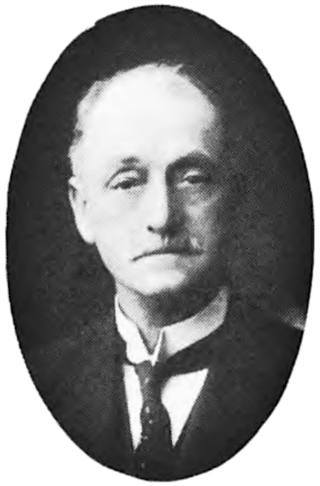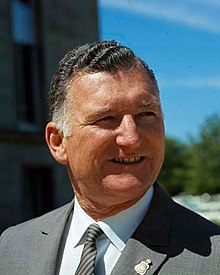
Sir John Grey Gorton was an Australian politician, farmer and airman who served as the 19th prime minister of Australia from 1968 to 1971. He held office as the leader of the Liberal Party of Australia, having previously served as a senator for Victoria. He was the first and only member of the upper house of the Parliament to assume the office of prime minister.

Vernon Hamersley (1871–1946) was an Australian politician. He served the longest term ever as a Member of the Western Australian Legislative Council.

Major General Edmund Alfred Drake-Brockman, was an Australian soldier, politician, and judge. He served in both the First and Second World Wars. He was a Senator for Western Australia from 1920 to 1926, representing the Nationalist Party, and later served as a judge of the Commonwealth Court of Conciliation and Arbitration from 1927 until his death in 1949.

Sir Shane Dunne Paltridge KBE was an Australian politician. He was a member of the Liberal Party and served in the Menzies Government as Minister for Shipping and Transport (1955–1960), Civil Aviation (1956–1964), and Defence (1964–1966). He was a Senator for Western Australia from 1951 until his death in 1966. Prior to entering politics he worked as a bank clerk, hotel manager and soldier.

The National Alliance was an Australian electoral alliance. The alliance was formed in 1974 as a short-lived arrangement between the Western Australian branches of the Country Party and Democratic Labor Party (DLP), covering the 1974 Western Australian state election and 1974 federal election.

No. 466 Squadron RAAF was a Royal Australian Air Force (RAAF) bomber squadron during World War II. Formed in the United Kingdom in late 1942, the squadron undertook combat operations in Europe until the end of the war, flying heavy bomber aircraft. Following the conclusion of hostilities with Germany, the squadron began retraining to undertake operations in the Pacific against the Japanese, but the war came to an end before it left the UK. In late 1945, the squadron was disbanded.

Sir David Eric Fairbairn, was an Australian politician. He was a member of the Liberal Party and served in the House of Representatives from 1949 to 1975. He held ministerial office as Minister for Air (1962–1964), National Development (1964–1969), Education and Science (1971), and Defence (1971–1972).

Charles Robert "Bert" Kelly was an Australian politician. He was a member of the Liberal Party and was an influential campaigner for free trade and the elimination of tariffs. He held ministerial office under Harold Holt and John Gorton as Minister for Navy (1967–1968) and Minister for Works (1968–1969). He represented the South Australian seat of Wakefield in the House of Representatives from 1958 to 1977.

Malcolm Fox Scott was an Australian politician who served as a Senator for Western Australia from 1950 to 1971, representing the Liberal Party. He served as a minister in the Gorton government from 1968 to 1969. Scott was a farmer before entering politics.

Frederick Walter Collard was an Australian politician and trade unionist. He was a member of the Australian Labor Party (ALP) and served in the House of Representatives from 1961 to 1975, representing the Western Australian seat of Kalgoorlie. He was a gold miner and Australian Workers' Union official before entering parliament.

Hugh Victor Halbert was an Australian politician. He was a member of the House of Representatives from 1958 to 1961, representing the Western Australian seat of Moore for the Liberal Party. He later served as the party's state president from 1965 to 1968.
This is a list of members of the Australian Senate from 1956 to 1959. Half of its members were elected at the 9 May 1953 election and had terms starting on 1 July 1953 and finishing on 30 June 1959; the other half were elected at the 10 December 1955 election and had terms starting on 1 July 1956 and finishing on 30 June 1962. The process for filling casual vacancies was complex. While senators were elected for a six-year term, people appointed to a casual vacancy only held office until the earlier of the next election for the House of Representatives or the Senate.

Air Commodore Raymond James Brownell, was a senior officer in the Royal Australian Air Force (RAAF) and a First World War flying ace. Born in Hobart, Tasmania, Brownell was working as a clerk with a firm of accountants when he enlisted in the Australian Imperial Force on the outbreak of the First World War. He served during the Gallipoli Campaign before transferring to the Western Front. Awarded the Military Medal for his actions during the Battle of Pozières, he was accepted for a transfer to the Royal Flying Corps in 1917. After flight training in the United Kingdom, Brownell was commissioned as a second lieutenant and posted for operational service over the Western Front in September 1917. Moving with his squadron to Italy, he was awarded the Military Cross and credited with shooting down 12 aircraft by war's end. Taking his discharge in 1919, Brownell returned to Australia.

The Gorton government was the federal executive government of Australia led by Prime Minister John Gorton. It was made up of members of a Liberal-Country Party coalition in the Australian Parliament from January 1968 to March 1971.
Edgar Cyril Rushton was an Australian politician who was a Liberal Party member of the Legislative Assembly of Western Australia from 1965 to 1988. He served as a minister in the governments of Charles Court and Ray O'Connor, including as deputy premier to O'Connor from 1982 to 1983.

John Verdun Newton was an Australian politician and Royal Australian Air Force (RAAF) officer. While serving with the RAAF in Europe during the Second World War, Newton was elected to the Parliament of Western Australia for the seat of Greenough at the 1943 state election, but was killed in action 55 days later.

Francis Edward Sykes Willmott was an Australian politician who was a member of both houses of the Parliament of Western Australia, serving in the Legislative Assembly from 1914 to 1921, and then in the Legislative Council from 1921 to 1926. He was the leader of the Country Party from 1915 to 1919.
Victor Jasper "Vic" Ferry DFC was an Australian politician who was a member of the Legislative Council of Western Australia from 1965 to 1987, representing South-West Province.

Alfred Napoleon Piesse was an Australian politician who served as a member of the Legislative Assembly of Western Australia from 1911 to 1924, representing the seat of Toodyay. He joined the Country Party upon its formation in 1914, and served as state deputy leader from 1915 to 1921, initially under Francis Willmott and then under Tom Harrison.
Lindsay Thorn was an Australian politician who was a Country Party member of the Legislative Assembly of Western Australia from 1930 to 1959, representing the seat of Toodyay. He was a minister in the government of Sir Ross McLarty.















